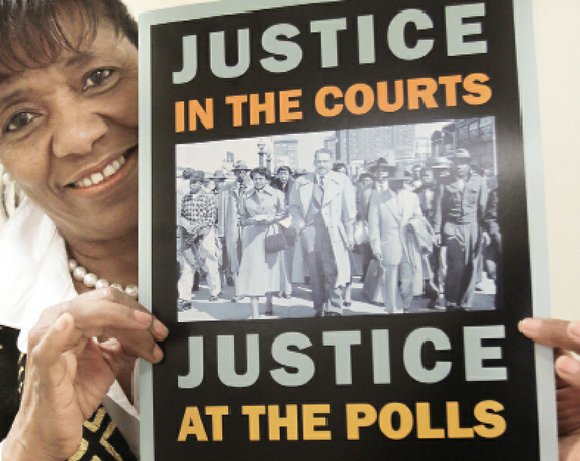Selma march inspires Richmonder
Joey Matthews | 3/12/2015, noon | Updated on 3/14/2015, 1:37 p.m.

Rita Willis said she was overcome with emotion when she reached the top of the Edmund Pettus Bridge in Selma, Ala., late Sunday afternoon.
“I just broke down and cried,” the 65-year-old Henrico County resident said.
Ms. Willis was among the tens of thousands of people from across the nation — including President Obama, his family, dignitaries and foot soldiers from the time — who assembled in Selma last weekend to commemorate the 50th anniversary of the “Bloody Sunday” march that served as a catalyst and turning point in the Civil Rights Movement.
“There were black and white people, young and old, and children of all colors,” Ms. Willis told the Free Press on Tuesday after her return to Richmond. “It was an incredible experience that I’ll never forget.”
The weekend’s events honored the roughly 600 demonstrators who, on March 7, 1965, were viciously beaten with batons and sprayed with tear gas and high-powered water hoses by dozens of white police officers and state troopers as they sought to cross the Edmund Pettus Bridge in a march for voting rights.
The bloody violence shocked the nation and helped build congressional support and momentum for passage of the Voting Rights Act months later. It was signed into law by President Lyndon B. Johnson in August 1965.
“There are places, and moments in America where this nation’s destiny has been decided.
“Selma is such a place,” President Obama told a sea of people gathered at the foot of the bridge for Saturday’s tribute before the nation’s first African-American president led a crowd estimated at 40,000 across the bridge.
The president was introduced by Rep. John Lewis of Georgia, who at age 25, helped lead the march 50 years ago when he was chairman of the Student Nonviolent Coordinat- ing Committee. He was nearly beaten to death by police, his skull fractured and bloodied.
“There’s still work to be done,” Rep. Lewis reminded those at the rally. “Get out there and push and pull until we redeem the soul of America.”
Their stirring remarks reflected on the major progress made in the last 50 years while spotlighting the massive work toward equal justice that remains.
Many people drew comparisons of the brutal police actions in Selma 50 years to the incidents today across the nation involving the slayings of unarmed black men by white police officers, including the death of 18-year-old Michael Brown in Ferguson, Mo.
On Wednesday, Ferguson Police Chief Thomas Jackson resigned following a scathing U.S. Justice Department report that found widespread racially biased abuses in the city’s police department and municipal court.
“What happened in Ferguson may not be unique, but it’s no longer endemic, or sanctioned by law and custom,” President Obama said. “And before the Civil Rights Movement, it most surely was.”
However, he noted, “50 years from ‘Bloody Sunday,’ our march (toward justice) is not yet finished, but we’re getting closer.”
After a stirring worship service at historic Brown Chapel A.M.E. Church in Selma, Ms. Willis and about 70,000 people walked across the Edmund Pettus Bridge on Sunday in commemoration of the marchers 50 years ago.
“When I got to the top of the bridge, I could just feel what they went through, the fear I’m sure they felt, seeing the dogs and water hoses on the other side,” Ms. Willis said. “It was a powerful and incredibly moving feeling.
“This is a reminder for all of us that people got killed for the gains we’ve made.”
Ms. Willis said she drove 14 hours from Richmond to Selma with her nephew, Vance Hayes Jr., and his wife, Tia. “We arrived about 7:20 Sunday morning and stayed all day,” she said.
She said she decided to go to Selma “at the spur of the moment,” as she sat in her office last Thursday at the Virginia Hispanic Chamber of Commerce in Chesterfield County, where she works as a consultant. She got tickets to sit inside Brown Chapel AME because of last-minute ticket cancellations by others.
Ms. Willis said she was “on cloud nine,” as luminaries entered nearby. They included U.S. Attorney General Eric Holder, Martin Luther King III, and the Revs. Jesse Jackson Sr. and Al Sharpton, who preached the sermon.
Ms. Willis said Rev. Sharpton urged those attending the Selma commemoration to re-engage in their communities and push for Congress to restore Section 4 of the Voting Rights Act, which requires states with histories of minority voter suppression, including Virginia, to get permission from the U.S. Justice Department before changing voting laws. The U.S. Supreme Court eliminated that portion of the federal law in 2013.
“We’ve got to leave here today not talking about what we did, but what we must do now,” Rev. Sharpton said. “We’re going to Washington ... [to] force this Congress to deal with the Voting Rights Act.”






